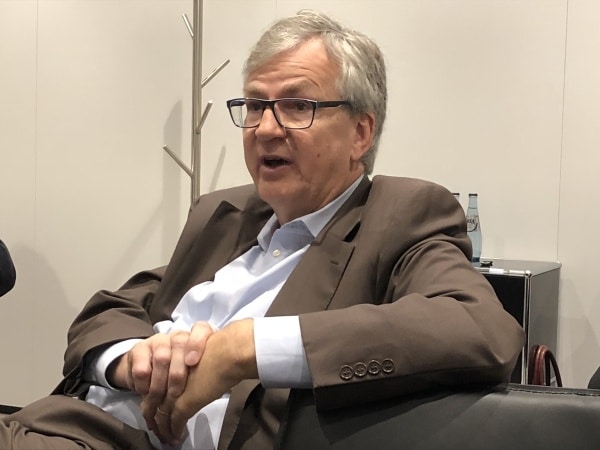Daimler’s Daum: Trade war would have ‘no winners’

HANNOVER, Germany – The business of making trucks is booming at Daimler Truck and Bus. Sales for the company were up 13% in the first half of 2018, and orders are up 38%. “That’s why we’re equally optimistic about the second half of the year,” says CEO Martin Daum. “The sentiment of our customers is strong.”
But there are still challenges to overcome – including protectionist economic policies and tariffs.
“A trade war at the end of the day will have no winners. Just losers,” Daum stressed during a media roundtable at the IAA truck show in Germany, describing himself as a proponent of open borders.
“We employ thousands of people and we invest hundreds of millions of dollars in each and every market.”
Still, it doesn’t make sense to duplicate the same activities in every one of those markets. There are business benefits to spreading manufacturing activities and expertise around the world.
A series of tariffs sparked by U.S. President Donald Trump has so far not led to any shifts in Daimler’s global supply chain strategies. Daum says the manufacturer takes a long-term view when securing the sources for all things needed to produce a truck. Over time, though, tariffs could require changes, he says.
Changing suppliers would be no small decision. New sources require new tooling, and any new suppliers need to have their offerings tested. Truck makers also deal with relatively low purchasing volumes when compared to their automotive counterparts. And even if changes are made, such shifts tend to be accompanied by higher prices as well.
The long-term effect of tariffs is not limited to rising commodity prices alone. Trade wars could also trigger a recession, he says. And higher interest rates could dampen truck sales.
For now, bigger challenges include the supply chain’s capacity to meet strong customer demand. “We have to manage bottlenecks. This is as difficult as navigating a downturn,” Daum says. “We have a lot of suppliers where we’re really pushing the needle.”
The focus on the future is broader than immediate truck sales, too. During the IAA truck show, Daimler showcased a broad array of updates to European trucks including the Actros, semi-autonomous driving systems now available today, and electrified powertrains for selected applications like transit buses.
There are also an increasing number of opportunities to adopt technologies originally developed by the company’s automotive business unit. “I see more synergies than ever,” Daum says, referring to everything from electrification to autonomous capabilities.
“Nearly everything you’ve seen today, you’ll see,” he adds, referring to IAA product launches that could soon be echoed in North America. “Things are sometimes closer than they appear.”
There are still challenges to overcome before some of the technologies are introduced, of course. Those buying a Mercedes-Benz Actros can now order a video system to replace traditional West Coast mirrors, but an outright replacement is not yet legally allowed by North American regulators.
“We are lobbying for those things because we see a certain benefit,” Daum says, referring to the combination of improved aerodynamics and visibility made possible by such systems.
“Gains have certainly been made in electrification, but it’s still not appropriate for every application,” he adds. It’s a matter of economics. Electrified buses are twice the cost of their diesel-powered counterparts, and those running on fuel cells are double that. “And we don’t have the hydrogen infrastructure,” he says. “We are clearly aware of the technology, but we don’t see the timeline at the moment.”
“If there’s a market, we’ll be there.”
More will be coming in communications support, meanwhile. The Daimler CEO hints at an increasing role for smartphones, replacing the need for drivers to be equipped with a second or third device.
“Hours of service could be put on that as well as telematics information,” he says.
Daum would also like to see trucks equipped with speech recognition tools such as those now available in Mercedes-Benz cars. “I would love to have a similar system on the trucking side.”
The data being communicated by a truck is already helping to refine the equipment on the road today.
Daimler engineers once investigated the need for changes and updates after reviewing 20-30 reported incidents. Now every engineer who oversees a part can review related trouble codes collected in the previous 24 hours. “It cuts about four months out of the solution for us,” he says. The timelines could become faster still, as computer routines continue to analyze data.
“I don’t know how the truck in 2030 will look,” Daum said. But he was quick to add it will carry a Freightliner or Western Star badge.
Have your say
This is a moderated forum. Comments will no longer be published unless they are accompanied by a first and last name and a verifiable email address. (Today's Trucking will not publish or share the email address.) Profane language and content deemed to be libelous, racist, or threatening in nature will not be published under any circumstances.